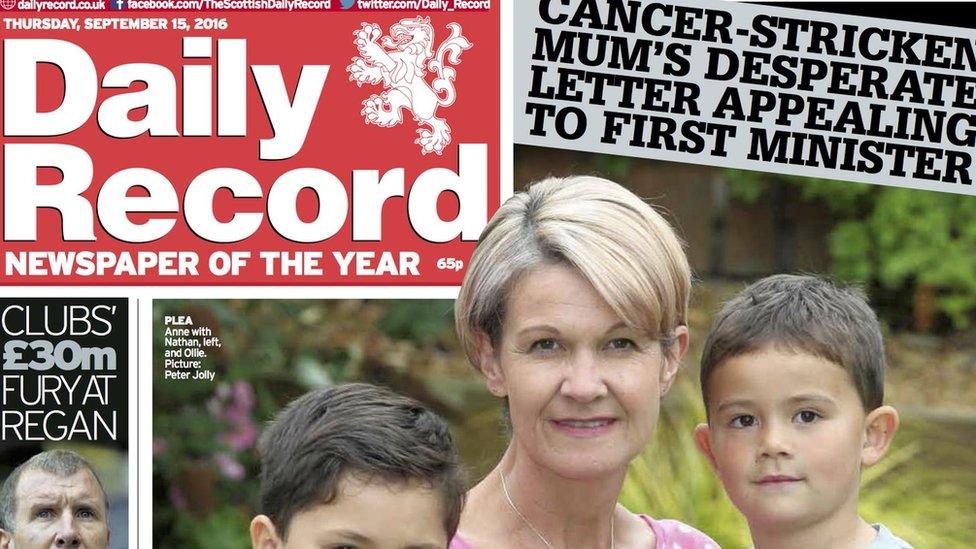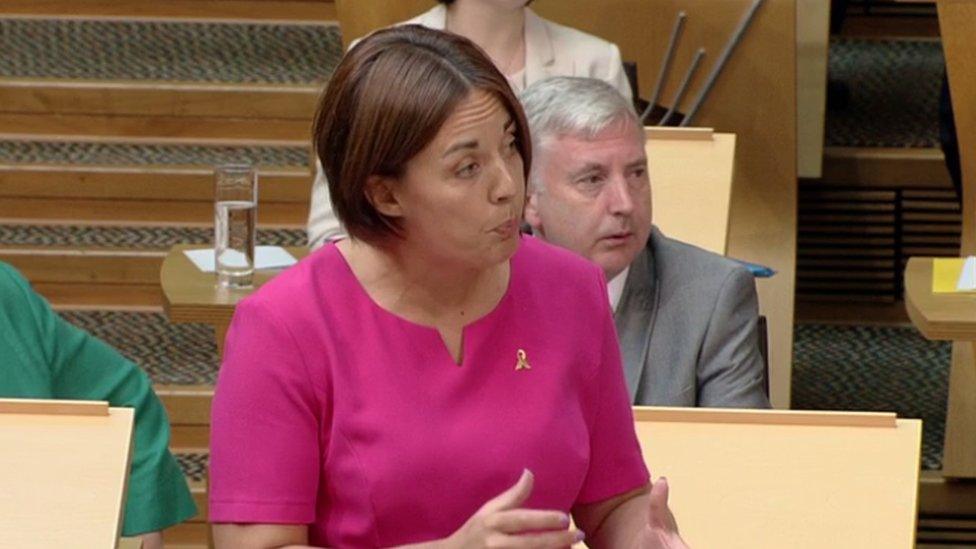FMQs: A remarkable development over cancer drug
- Published

Anne Maclean-Chang, who is suffering from secondary breast cancer, made a plea to the first minister in the Daily Record newspaper
Politics, almost by definition, operates in generic mode. Tax and spending policies tend to apply widely, if not universally.
When politics enters the particular, it can become additionally challenging. Such were the circumstances during questions to the first minister today.
Labour's Kezia Dugdale raised the case of a Moray woman, Anne Maclean-Chang, who is suffering from secondary breast cancer.
To pursue the issue more directly, Ms Dugdale held up a copy of the Daily Record which had published a "desperate letter" from the woman to the first minister.
In summary, Mrs Maclean-Chang's consultant had suggested that use of a particular drug might prolong her life.
Her health board refused to fund the treatment, on generic policy grounds. A request for individual patient treatment was also rejected.
Hence the Record splash. Hence the letter to the FM. Hence questions today. And, hence, a remarkable development.

Kezia Dugdale highlighted Mrs Maclean-Chung's case at Holyrood
Ms Sturgeon disclosed that the previous opposition had been overturned by the health board and that the drug would be prescribed after all.
Her office had, apparently, contacted the health board with an inquiry when they received the patient's letter yesterday.
So did this amount to a ministerial intervention? Not so, according to the FM when she answered Ms Dugdale's questions. It was a case of the system ultimately arriving at a suitable outcome.
During this exchange, Ms Dugdale could be seen mouthing the phrase "oh, come on!". More than once.
To be entirely fair to the FM, this adds to the point made at the outset: that the particular poses problems.
It is one thing to make generic comments about drug prescribing policy. It is another matter entirely to maintain cool detachment when confronted with a front page, headlined: "Dear Nicola Sturgeon, Please Keep Me Alive".
Accompanied by a picture of the woman in question, alongside her two young sons.

Ms Sturgeon insisted her office had not pressurised NHS Grampian into changing its mind on the cancer drug
At which point, we return from the particular to the general. Ms Dugdale sought reform to the wider system, in order to guarantee that the circumstances afflicting the Elgin mother would not be repeated.
Ms Sturgeon resolutely declined to give such a guarantee. Firstly, she argued that such decisions should not be a matter for ministers. It would be wrong for politicians to rule on individual cases: it should be left to clinical and health board professionals.
Secondly, she made the broader point that the NHS cannot provide every single drug demanded by every single patient, regardless of cost and efficacy. As a rider to that, she urged drug companies to seek to cut the cost of treatment to the health service.
She noted further that there was a review currently under way into such matters.
All of which is a perfectly coherent argument when made in generic terms. Translated into the particular, it is more difficult to defend. Such is life.
The remainder of the question session tended to stick in general mode. Ruth Davidson, for the Conservatives, for example, dealt robustly with the issue of spending on agency nurses and locum doctors.
Detected a villain
She suggested that the system was not being well run on the SNP's watch. Equally robustly, Ms Sturgeon said that staff numbers were at record levels and the use of agency provision was down.
For the Liberal Democrats, Willie Rennie pursued an issue he has made his own: policing and its apparent failings under the reformed system. Ms Sturgeon disputed his assertions.
Then to different matters. Graham Simpson, a Tory MSP, voiced irritation at boundaries for local council wards. An official report had recommended changes. Ministers had accepted most - but rejected some, including within the great and noble city of Dundee.
Mr Simpson detected a villain. It was Joe Fitzpatrick, the Minister for Parliamentary Business - and MSP for Dundee West. So exercised, indeed, did Mr Simpson become that he branded the minister "Gerrymandering Joe".
Now, Mr Fitzpatrick is normally the mildest of men. His parliamentary interventions are usually restricted to declaring "formally moved" when he is invited by the Presiding Officer to introduce business motions.
However, as a power behind the scenes, he has a tough edge. And, presumably, being immersed in Dundonian politics, he has been called worse things in the past.
Still, Ms Sturgeon felt the need to leap to his defence. With only the tiniest hint of acid, she pointed out to Mr Simpson that the Dundee ward plan had been endorsed by every party on the city council. Including the Tories. Mr S. subsided, still smiling.
Then enter Edward Mountain. His rock-like name obviously hides a tender edge. Firstly, he invited the FM to take a stroll with him in the Highlands. Then he looked more than a mite discomfited when, unaccountably, she demurred.
To explain. Mr Mountain did not envisage a bucolic ramble, with perhaps a country tea at the tired close of the day. He did not intend to sing nature songs or spout Shelley in the first minister's ear.
Rather, the Conservative MSP wanted to show her the true nature of pastoral life and, as a landowner, to express the hope that she might obsess less about control of Scotland's acres.
With a wicked grin, Ms Sturgeon repeated Mr Mountain's opening suggestion that his register of interests was open and available. It would indeed, she said, repay inspection. As to the offer of a stroll, bit busy and all that sort of thing.
- Published14 September 2016
